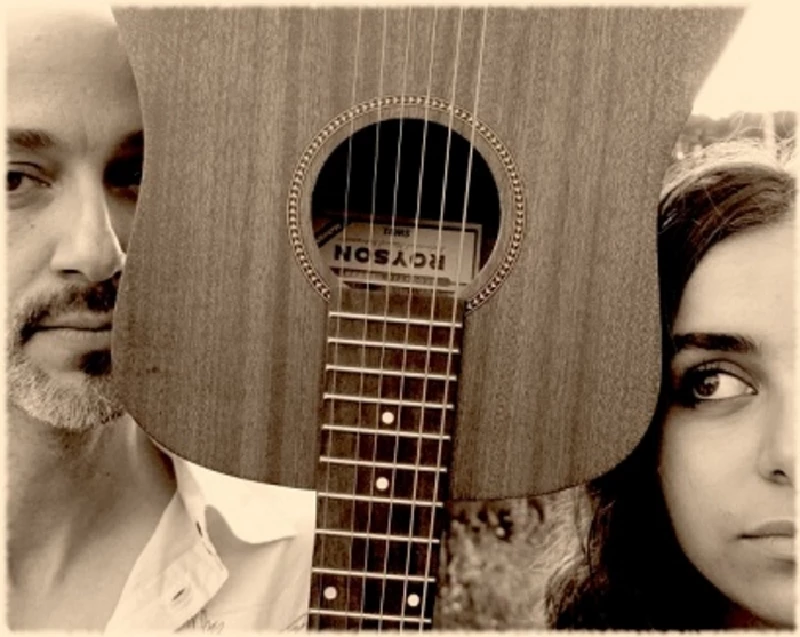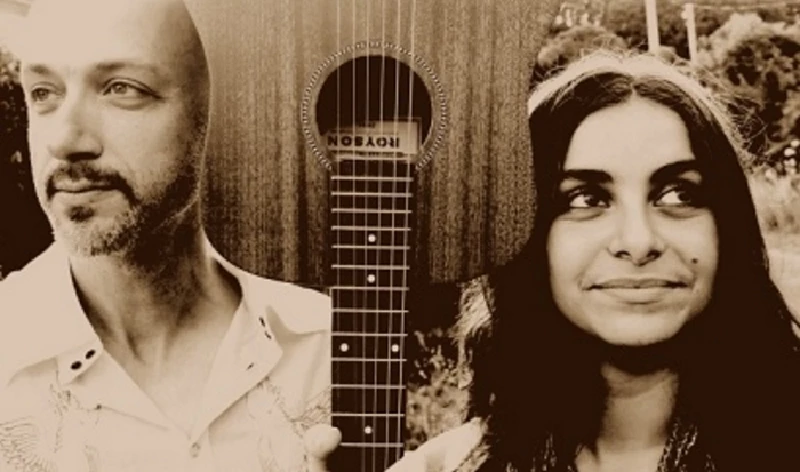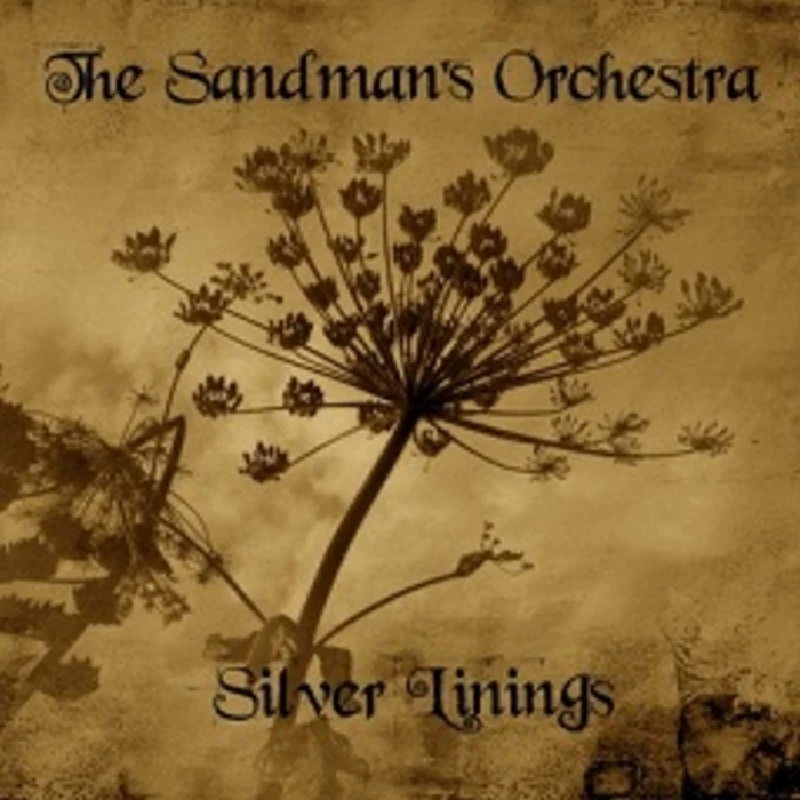Sandman's Orchestra - Interview
by John Clarkson
published: 26 / 6 / 2011

intro
John Clarkson speaks to French musician and songwriter Pierre Laplace about his new folk-influenced band the Sandman's Orchestra which he has formed with his 16 year old niece, Léonie Gabriel, and who have just released their debut album, 'Silver Linings'
The Sandman’s Orchestra is the new band of Pierre Laplace, a songwriter and guitarist from Lille in France, and his 16 year old niece, Léonie Gabriel. Laplace is the former front man with cult band Vera Clouzot, who released on a variety of French labels four albums of lo-fi, experimental rock, ‘Vera Clouzot’ (1996), ‘The Moon When the Cherries are Red’ (1998), ‘Kachina’ (2000) and ‘De Guerre Lasse’ (2002). The subject of a Pennyblackmusic interview two years previously, Vera Clouzot broke up amicably in 2003. Even before their split, Laplace had started a solo project Kenyon, which released an album, ‘Haunted’, also in 2003. The Sandman’s Orchestra was formed last year when Léonie sung some covers at a family lunch, and an impressed Laplace immediately invited her to work on some songs with him. The duo have just released their debut album, ‘Silver Linings’, through the Bandcamp website, and which they recorded in Laplace’s home studio. Both Laplace and Léonie sing in English, Laplace’s gravely voice matched by Léonie’s astonishingly mature and world weary-sounding vocals. ‘Silver Linings’, like all of Laplace’s records, is an album of slow-burning atmospherics and tensions. Tinged with touches of both folk and jazz, its tone is mournful and bleak, but it finishes on a note of hope with the last two tracks, ‘Cradle of Light’, the only song on which Laplace sings solo, and ten minute closer, ‘Everything Comes Alive’. Pennyblackmusic spoke to Pierre Laplace about the Sandman’s Orchestra. PB: Your previous band Vera Clouzot was named after a 50's French actress who died young and who was one of the wives of the director Henri-George Clouzot. From what does the Sandman's Orchestra get its name? PL: It came from a family brainstorming, where we all discussed possible names. I wanted to have something with the word "orchestra" in it. I remember suggesting "the Sinking Orchestra"! I finally came up with "The Sandman's Orchestra". I liked the reference to this character of the sandman, who appears either as a benign or malevolent character in various tales, depending on the countries. Plus some our of music has a nocturnal feel, so the name seemed fitting. PB: After Vera Clouzot broke up in 2003, you formed a solo project Kenyon, which released an album 'Haunted'. Vera Clouzot's first two albums were sung in English, but their latter two in French. 'Haunted' and 'Silver Linings' each have their vocals in English. What has prompted this permanent return to singing in English? PL: It's always been natural for me to sing in English, because I listen almost exclusively to American or British music. Whenever I strum a guitar or play the piano and start singing whatever comes through my head, the words come up in English. The two albums I did with Vera Clouzot that were sung in French were a kind of parenthesis for me. In fact the other guys in the band prompted me to at least try to sing a couple of songs in French, and it worked out. I enjoyed it, but writing in French requires much more effort. It's not a language that is naturally musical. So the return to singing in English is probably permanent. PB: The Sandman's Orchestra was formed last May after a family lunch when Léonie played and sung a few covers, and you offered immediately to work on some songs with her. The album seems to have come together pretty quickly since then, being recorded and released within a year. How many of its eleven songs were written beforehand and adapted for the Sandman's Orchestra, and how many are entirely new compositions? PL: Before I started working with Léonie, I'd spent two years setting up a small home studio and learning how to use my new equipment. I had recorded various bits and pieces of music, but nothing completed or final, apart from 'To the Moon', of which I'd done several different versions, none of which I was entirely happy with. I wasn't really sure of what direction to take or what I wanted to achieve musically, but as soon as I heard Léonie sing I had this vision of the two of us playing folk music. I had a gut feeling that it could work out. So I was very motivated and set to writing songs. I just couldn't stop writing and recording, trying different arrangements for each song. Léonie's voice and musical talent gave me the inspiration and motivation that I'd partly lost while experimenting with musical pieces on my own, without any clear goal in mind. PB: Vera Clouzot was formed in 1993 when you were 24 and teaching English in a secondary school with two of your pupils who were then aged 16. Kenyon similarly briefly involved someone called Ambroise who was again younger than you. What is the appeal to you of working with people younger than you? PL: Actually I never intended to work with people younger than I am. It just happened by chance. I would have happily worked with a 60-year-old woman if she'd had a great voice! But working with someone so young - Léonie was 15 when we started our duo- is an interesting and rewarding experience. Léonie is a quick learner. She's very enthusiastic and approaches things with a fresh perspective. In spite of our great difference in age, there was an instant connection with her on a musical level. I think we've both been learnt a lot from each other. PB: Léonie, however, hardly sounds like an average 16 year old and someone much older and in many ways very world worn. Was that part of the appeal to you of collaborating with her? PL: Absolutely ! The first time I heard Léonie sing I was amazed at how mature her voice sounded ; I remember her singing covers like 'Hallelujah', 'Georgia on My Mind' and 'Over the Rainbow', and her voice was perfect for this kind of material, soulful, emotional with great tone and range. Léonie has, as several listeners have pointed out, a voice beyond her years. I instinctively knew that her voice would be perfect for the sort of music I've always loved, folk songwriting, ballads, vocal jazz. PB: There is a sense of mournfulness to much of 'Silver Linings'. Loss seems to be a dominant theme on 'Silver Linings', whether it be the end of romance of on 'How Lonely' and 'Hello Stranger', through the passing on time on 'How We Used to Feel', or by death on 'You Won't Be Lost'. Would you agree? In light of that, why did you decide to call the album 'Silver Linings'? PL: Loss is definitely a dominant theme the album ; we started singing and playing music together right after someone in our family, someone very close, had died. In fact, up to that moment, I hadn't seen Léonie very often and didn't know her that well, as she lives 500 miles from my hometown. As is often the case, dramatic circumstances bring family members closer to each other, so I got to know Léonie better and found out about her precocious musical talent while being at the same time grief-stricken. It is this mixture of emotions that gave birth to most of the songs on the record. It is an album haunted by loss but it is also a celebration of life, a quest for light and beauty. That is why I decided to call the album 'Silver Linings'; I'm naturally drawn to darkness, but I also look for light beyond it. PB: 'The World Won't Remember Your Name' seems to be the most damning indictment on the superficiality of fame. Was that what was intended with it? PL: It was in part my intention, but it is mostly about the passing of time, how time takes away some of our dreams; when I wrote this song, I remembered some live footage I'd seen a long time ago of an 80's pop band. There was a girl playing the tambourine and doing backing vocals. I remember thinking: do you realize that right now you're caught in the moment, but that it can't, and won't last? What will your life be like 20 years from now? How will you feel then, remembering the girl you once were? I guess the sentiment in the song is rather bittersweet, but there is also some tenderness towards that person : the world may have forgotten your name, but I remember you and how nice it was to see you, up on that stage, living your dream for a while. PB: 'Everything Comes Alive' is the final track on the album. Why did you decide to put that on last? It is both the most leftfield and longest track on the album. Was it because of that or, as it is more optimistic in theme, did you also want to end it on a note of hope? PL: I decided to end our album with this song for the reasons you mention. I wanted to try and combine songwriting and soundscapes/sonic experimentation. I see this track as a long journey, with meditative moments, hints at darkness, but with an overall feeling of hope. This song was written in July 2010 while I was staying at Léonie's place in the South of France. I was improvising on her brother's upright piano and came up with the chorus of the song. Léonie lives in an old mill by a river, deep in the countryside, and I found solace both in the natural world and in the music that we played together at her place. The lyrics reflect these feelings. PB: You're a guitarist and a vocalist. The album features various other instrumentation including piano, a Wurlitzer, drums and briefly brass. How many of those instruments did you play and how many other musicians were involved in it making? PL: I played most instruments on this record: acoustic and electric guitar, banjo, ukulele, piano, wurlitzer, keyboards and percussion. I also programmed some beats. We've had two guests on this album, two friends of mine: Christophe Motury (aka Mr Pher) played the trumpet on 'May Flowers', and JB Hoste played the drums on five tracks. This is the first time I've been in charge of a musical project from start to finish. With my previous solo project, I wrote the songs and let friends of mine record and arrange them. PB: You told us when we last interviewed you ten years ago that you had often struggled with Vera Clouzot to find a label because releasing records in France sung in English was commercial suicide. Is this why you decided to self-release 'Silver Linings' through Bandcamp? PL: I didn't want to go through the hassle of sending demos to labels, I knew that nobody would sign an unknown band like us. We decided to go the whole DIY route, recording the songs at home, and releasing the album ourselves. The good thing with Bandcamp is that you set the price of the CD and of the download, and you can choose to sell a whole album only and not individual tracks. That was important to me. I guess I'm old-school but I still believe in the beauty of the album as an artistic statement. Good albums are journeys that will take you through various emotional landscapes and will give you a rewarding experience. Of course, without the support of a record label, you have to promote your music yourself, which is not an easy task. Seven months ago we joined the Soundcloud community and started sharing our music there; since then, we've had a lot of positive feedback and have made connections with nice people and talented musicians all over the world. Our album has just been released and we're beginning to have orders from people who found out about our music on Soundcloud, mostly people from the UK and the US. PB: You are the main songwriter in the Sandman's Orchestra with Leonie contributing some of the vocal harmonies. Do you think that it will continue like this, or is this something that you think will develop and change with Léonie writing more and in other directions as the group continues to evolve? PL: I'd love to have Léonie contribute more music for a future album. When we started our duo, she'd been playing covers for a while but hadn't written music of her own; I asked her to contribute one piece of music to 'Silver Linings'. I showed her some open-tunings on the guitar, then I wrote the lyrics to "Cradle of Light' for her, and asked her to try and come up with an open-tuned guitar part and her own vocal melody. The first time she played 'Cradle of Light' for me over the phone I knew she had created something special. It will be great to see Léonie grow and evolve both as a singer and composer. PB: You played occasional gigs with both Vera Clouzot and Kenyon. Will you be doing the same with the Sandman's Orchestra? PL: Probably not in the near future, because of the geographical distance between us and because Léonie will take her A-levels next year. We'll see how things go with our duo, but we'd both love to play concerts some day. PB: Thank you.
Picture Gallery:-


most viewed articles
current edition
Peter Doherty - Blackheath Halls, Blackheath and Palace Halls, Watford, 18/3/2025 and 21/3/2025Armory Show - Interview with Richard Jobson
Liz Mitchell - Interview
Deb Googe and Cara Tivey - Interview
Lauren Mayberry - Photoscapes
Max Bianco and the BlueHearts - Troubadour, London, 29/3/2025
Garfunkel and Garfunkel Jr. - Interview
Maarten Schiethart - Vinyl Stories
Clive Langer - Interview
Sukie Smith - Interview
previous editions
Heavenly - P.U.N.K. Girl EPBoomtown Rats - Ten Songs That Made Me Love....
Trudie Myerscough-Harris - Interview
Doris Brendel - Interview
Beautiful South - Ten Songs That Made Me Love...
Pulp - Ten Songs That Made Me Love...
Dwina Gibb - Interview
Kay Russell - Interview with Kay Russell
Barrie Barlow - Interview
Sound - Interview with Bi Marshall Part 1
most viewed reviews
current edition
Davey Woodward - Mumbo in the JumboNigel Stonier - Wolf Notes
Wings - Venus and Mars
Kate Daisy Grant and Nick Pynn - Songs For The Trees
Only Child - Holy Ghosts
Neil Campbell - The Turnaround
Philip Jeays - Victoria
Darkness - Dreams On Toast
Suzanne Vega - Flying With Angels
Charles Ellsworth - Cosmic Cannon Fodder
Pennyblackmusic Regular Contributors
Adrian Janes
Amanda J. Window
Andrew Twambley
Anthony Dhanendran
Benjamin Howarth
Cila Warncke
Daniel Cressey
Darren Aston
Dastardly
Dave Goodwin
Denzil Watson
Dominic B. Simpson
Eoghan Lyng
Fiona Hutchings
Harry Sherriff
Helen Tipping
Jamie Rowland
John Clarkson
Julie Cruickshank
Kimberly Bright
Lisa Torem
Maarten Schiethart